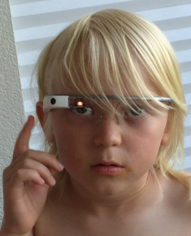I’m David Fetterman, evaluator, author, entrepreneur, and Google Glass user. Yesterday, we talked about what Google Glass is and how it can revolutionize communications. Today, let’s turn to thinking about how Glass could be used as an evaluation tool.
Hot Tips – Glass for Empowerment Evaluation: Youth (with parental permission) can wear the Glass to produce photovoice productions, sharing their pictures of their neighborhoods and videos of the activities. It’s easy (and fun) – that’s my son over on the right trying out Glass. Their stories can be used as part of their self-assessment, gaining insight into their lives and potentially transforming their worlds.
Community and staff members can post their digital photographs (and videos) on a common server or blog while conducting their self-assessment with the blink of an eye. This ensures community access, a sense of immediacy, and transparency.
Community and staff members can use Google Hangout on Glass to communicate with each other about their ratings, preliminary findings, and plans for the future.
Hot Tips – Glass for Traditional Evaluation: Evaluators can use it to communicate with colleagues on the fly, share data (including pictures and video) with team members, and conduct spontaneous videoconference team meetings. Note that everyone doesn’t need to have Glass, as Glass users can leverage its capabilities while connecting with others who are using Smartphones or computers.
Glass stamp dates photos, videos, and correspondence, ensuring historical accuracy.
Glass can be used as an effective “ice breaker” to gain access to a new group.
Evaluators can also solicit feedback from colleagues about their performance, with brief videos of their data collection and reporting behavior. There is a precedent for this type of critique – assessments of student teaching videos.
Glass can be used to provide “on the fly” professional development with streaming video of onsite demonstrations for colleagues working remotely.
In addition, Glass can help maximize evaluator’s multi-tasking behavior (when appropriate).
Lessons Learned – Caveats:
Take time to get to know people before disrupting their norm with this innovation.
Plan to use it over time to allow people to become accustomed to it and drop their company manners.
Respect people’s privacy. Ask for permission to record any behavior.
Do not use it in bathrooms, while driving, or in areas requiring additional sensitivity, e.g. bars, gang gatherings, and funerals.
In the short term, expect the shock factor, concerns about invasion of privacy, and a lot of attention. Over time, as the novelty wears off and they become more common place, Glass will be less obtrusive than a bag of digital cameras, laptops, and Smartphones.
Rad Resources:
Do you have questions, concerns, kudos, or content to extend this aea365 contribution? Please add them in the comments section for this post on the aea365 webpage so that we may enrich our community of practice. Would you like to submit an aea365 Tip? Please send a note of interest to aea365@eval.org. aea365 is sponsored by the American Evaluation Association and provides a Tip-a-Day by and for evaluators.


Hi David,
I am a PME student at Queen’s University, and am currently taking a course in evaluation.
I had never considered how technology could be used as a part of an evaluation outside of basic presentation tools and spreadsheets. However after reading your article, I can see how using a tool like this could be beneficial for collecting data on an ongoing basis. Many people do not like to do reflections, or fill in surveys in order to help document the progress of a program, so using a tool like this would not only entice people to participate in the data collection process for evaluations, but also give them a tool to help them document their experiences as well. I definitely think this is something worth exploring, and I thank you for sharing!
Shauna
Hi David,
I am currently taking a course on evaluation in the PME Program at Queens University, and our main task is to create an evaluation for an existing program. A part of the data and information collection in my evaluation is having students do short reflections of how they see themselves progressing while utilizing the program that I am creating the evaluation for. I have found that students typically have a difficult time doing self reflections for various reasons, including that they think they have to meet a certain standard, they think they are being evaluated, they aren’t sure how to self-reflect, or they find the task to be boring. I had never thought about how to include technology into an evaluation to make it more interesting, but coming across your article has definitely peaked my interest. I think that using a technology like this would not only allow students to take more interest in doing self reflections, but would also help those reporting on the evaluation findings to be able to collect the necessary information and put it all together in an easier and more interesting way than just using excel spreadsheets. I will definitely need to look more into it to learn about all that it can do, but you have definitely opened this door of learning for me, so thank you for sharing!
This post came to mind when I read a recent article on theatlantic.com (link and synopsis below). Are you still using google glass in evaluation? Have you had similar experiences with people feeling creeped out?
By including a recording device, the first-gen smart specs went from dorky to disturbing. Since its debut in 2012, Google Glass always faced a strong headwind. Even on celebrities it looked, well, dorky. The device itself, once released in the wild, was seen as half-baked, and developers lost int…
http://www.theatlantic.com/technology/archive/2015/01/how-the-camera-doomed-google-glass/384570/
Thanks for all the emails and posting on LinkedIn about Google Glass. Also thanks for the feedback from my Google Glass Explorers. Feel free to post here as well but no worries I have been getting all the notifications. Many thanks.